Garden Maintenance Pinner: Achieving a Flourishing Sanctuary
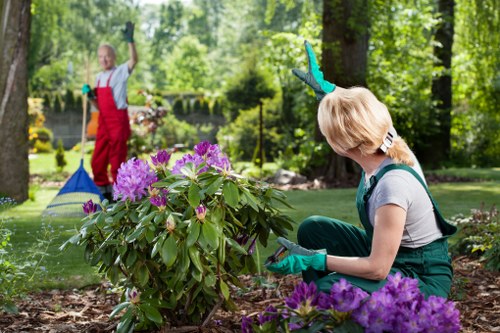
Welcome to our comprehensive exploration of Garden Maintenance in Pinner. Nestled in a unique suburban setting, Pinner residents enjoy a blend of urban convenience and natural beauty. In this article, we share expert advice, practical tips, and heartfelt insights to help you transform your outdoor space into a thriving green haven.
Garden maintenance in Pinner is not only about enhancing the visual appeal of your home, but also about preserving the delicate balance of nature. Every leaf, flower, and blade of grass contributes to the overall ecosystem. If you nurture your garden, it will reward you with a burst of energy, vibrant blooms, and a sanctuary away from the mundane daily routine.
Whether you are a seasoned green thumb or starting with basic steps, understanding the nuances of garden care in Pinner is essential. This guide offers simple instructions, seasonal strategies, and wisdom collected over years of experience, all presented with a blend of serious insights and empathetic guidance to support your gardening journey.
When it comes to garden maintenance in Pinner, planning is key. A well-planned garden layout can save time, money, and energy. Begin by assessing your garden's unique conditions. Consider the soil type, sunlight exposure, and the micro-climate of your outdoor space to select suitable plants. A close look at these factors will ensure that your chosen flora thrives throughout the seasons.
Local weather conditions in Pinner call for a balanced mix of hardy plants and delicate blossoms. It is important to understand the local environment in order to achieve sustainable growth. By opting for native and climate-adapted species, you support the region's ecosystem and reduce the likelihood of pests and diseases affecting your garden.
The first steps towards effective garden maintenance involve good preparation. Dig into the basics of garden design by creating a layout that considers both aesthetic and practical functions. Map out zones for relaxation, cultivation, and socializing, thereby making your garden a multifunctional space that meets both your personal and ecological needs.
As you develop your garden plan, it is vital to focus on soil care. Healthy soil forms the foundation of a productive garden. Regularly testing your soil will help you determine if it needs extra nutrients or better pH balance adjustments. Using organic compost or natural fertilizers can boost soil health and encourage vigorous plant growth.
Water management is another cornerstone of garden maintenance. In Pinner, where seasonal changes are evident, installing an irrigation system or maintaining a regular watering schedule can make a huge difference. Drip irrigation systems, for example, allow water to be delivered directly to the roots, reducing both waste and water bills.
In addition to soil and water, light plays a crucial role. Most plants need adequate sunlight to flourish. Strategically position your vegetation to take full advantage of the available sunlight, and consider using reflective surfaces to bounce additional light into shadowed corners of your garden.
Essential Garden Maintenance Practices
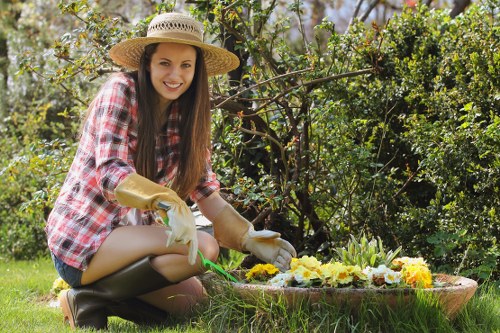
Maintaining a garden in Pinner involves a mix of routine tasks and seasonal adjustments. Every gardener will find that practices such as pruning, mulching, and pest control are critical to the overall health of a garden. By establishing a regular maintenance schedule, you can prevent problems before they start and ensure your outdoor space remains vibrant year-round.
A key aspect of garden care is pruning trees, shrubs, and flowering plants at appropriate times. Doing so encourages bushier growth and removes branches that may have been damaged by weather or disease. This careful attention to pruning not only enhances the aesthetic appeal of your garden but also supports healthy plant development.
Mulching is another essential practice. A good layer of mulch helps to control weeds, retain soil moisture, and regulate temperature fluctuations. Organic mulches also break down over time, contributing valuable nutrients back into the soil, and thereby sustaining the garden’s natural cycle.
Another important element in garden maintenance is regular weeding. Removing unwanted growth before it takes over ensures that your prized plants have adequate space and nutrients to develop. A consistent weeding regimen, combined with proper mulching, can make a significant difference in your garden’s long-term health.
It is also worthwhile to consider the role of fertilization. Using natural fertilizers such as compost or manure rather than synthetic options aligns with eco-friendly practices. When fertilizers are applied correctly, they accelerate the growth of plants and strengthen their resistance to disease.
Safety during garden maintenance should not be overlooked. Equip yourself with the proper tools—from sharp pruning shears to comfortable gloves and reliable footwear. These precautions can minimize the risk of accidents and make routine tasks much more enjoyable.
Water management, combined with regular feeding and mulching, creates a solid foundation for healthy plants. Implementing regular schedules—adjusted for seasonal variations—helps garden owners avoid overwatering or underwatering issues. Remember, each plant species may have different water requirements, so a tailored approach often yields the best outcomes.
The significance of periodic garden visits cannot be underestimated. By examining your garden closely, you can catch symptoms of disease or infestation early on. This proactive routine allows for quick and deliberate interventions, often saving your garden from extensive damage and unnecessary setbacks.
Complementary to weeding and fertilization, regular maintenance rituals such as raking leaves and checking for dead branches are essential. These simple tasks might seem mundane but are absolutely vital in keeping your garden pristine and inviting throughout the year.
Tools and Techniques for Garden Care
The proper tools can transform garden maintenance into an enjoyable routine. From spades and rakes to specialized tools like pruning saws and cultivators, every tool in your kit has a role. Investing in high-quality equipment not only enhances efficiency but also reduces long-term maintenance costs.
Along with the right equipment, proper techniques are just as critical. Learning the correct angles for pruning, the optimal depth for planting, and the best methods to apply fertilizers can result in healthier plants and a more visual appealing garden. Many experienced gardeners also emphasize the balance of speed and patience as key components in maintaining any garden.
The importance of ergonomics in garden maintenance is often overlooked. Choosing tools that are comfortable and reduce strain will allow you to work longer without suffering from repetitive stress injuries. Whether you are trimming a rose bush or aerating your soil, the right technique makes every task safer and more efficient.
Quality Tools for Every Garden
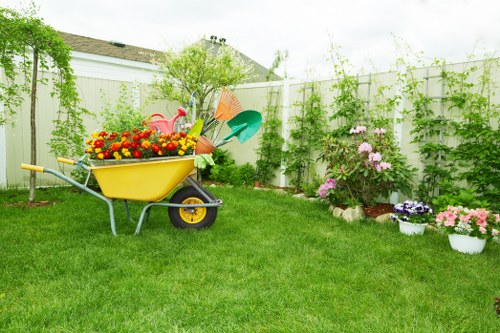
In every successful garden, premium tools play an indispensable role. While you may get by with basic equipment, investing in well-made tools can improve the quality of your work and even inspire new gardening ventures. A sharp pair of pruners, for example, is essential for maintaining clean cuts and reducing the risk of damaging your plants.
Modern innovations in garden tool design have focused on sustainability and ease of use. Ergonomic handles, rust-resistant metals, and tools designed for multiple functions are just a few examples of how the gardening industry has evolved. Finding the right balance between function and form can lead to an overall improvement in your maintenance routine.
Remember, every garden is unique. Adapt your tool selection to fit your specific garden’s needs. Whether you’re managing a delicate floral display or a robust vegetable patch, the appropriate tools can save you time and keep your outdoor space in top condition throughout the year.
The beauty of seasonal changes demands an adaptive approach to garden maintenance. As weather patterns shift, so too must the techniques you employ. Winter may require protective coverings for delicate plants, while summer calls for extra hydration strategies and regular pruning after the heavy growth spurts.
Adjustments must also be made in the application of fertilizers and watering schedules during seasonal transitions. Not all plants respond similarly to abrupt changes in temperature and daylight. As a gardener, it is crucial to monitor your green space and modify your maintenance routine to accommodate these shifts.
Embracing seasonal maintenance also means anticipating pest challenges and the emergence of invasive species. The proactive approach of monitoring attacked areas early on can prevent widespread infestation. This continual vigilance ensures that your garden withstands the pressures of nature while blooming beautifully in each season.
Seasonal Garden Tips
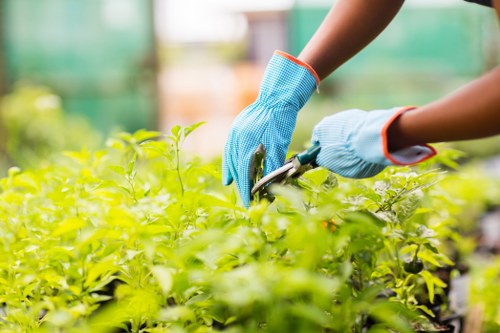
Seasonal garden care offers unique challenges and opportunities. In spring, the focus shifts to preparing the soil and planting early-bloomers. This rejuvenation period is a time of renewal, where every gardener can invest their energy into setting the stage for a year full of vibrant growth.
Summer maintenance centers around intensive watering and careful attention to sun exposure. Gardeners are encouraged to use mulches to moderate soil temperature and techniques such as deep watering to promote strong root systems. At the same time, shade-loving plants should be strategically placed in cooler, less exposed areas.
Autumn and winter periods require a more protective approach. Covering or moving tender plants indoors, applying organic compost to enrich the soil, and preparing for a restful period are all steps to ensure that the garden survives and thrives when the weather warms again.
Many gardeners today are turning to organic and eco-friendly practices as a cornerstone of their maintenance strategies. Avoiding harsh chemicals in favour of natural alternatives protects not only your plants but also the surrounding environment. Organic compost, natural pest repellents, and companion planting are all methods that contribute to a more sustainable garden.
This eco-friendly approach supports biodiversity and nurtures local ecosystems. Garden Maintenance in Pinner has seen a surge in environmental awareness, leading to practices that are as kind to nature as they are effective in promoting plant health. The use of organic methods helps create a balanced ecosystem that benefits both flora and fauna.
Furthermore, sustainable gardening practices create a ripple effect in the community. Sharing compost, seeds, and energy-saving techniques not only fosters a close-knit neighborhood but also serves as an educational tool for the next generation of gardeners.
Local Garden Maintenance in Pinner
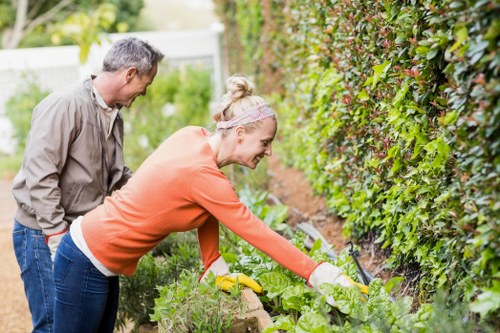
One of the most exciting aspects of garden maintenance in Pinner is the strong sense of local community. Gardeners here often share insights, tools, and even produce with their neighbours. This culture of sharing builds an environment where everyone is invested in the beauty and health of their surroundings.
The local climate and urban setting of Pinner mean that garden care often involves creative solutions and adaptive techniques. Many residents mix traditional practices with modern innovations to produce stunning outdoor spaces that are both eco-conscious and visually appealing. In doing so, they contribute to the overall improvement of their community.
Local initiatives, such as community gardens, workshops, and volunteer days, help to spread knowledge about the best methods for maintaining a healthy garden. This collective approach fosters an ongoing exchange of ideas and encourages homeowners to experiment with new practices, ensuring a continuous cycle of learning and improvement.
Pinner is not only a hub for passionate gardeners but also a gateway to a range of nearby areas that also cherish outdoor beauty. Neighborhoods such as Harrow, Stanmore, Edgware, Wembley, and Finchley are just a few examples where local garden maintenance is a shared interest. Each area offers unique conditions, like varying soil types and microclimates, which influence the gardening techniques adopted by residents.
For instance, in Brent Cross and Northwood, gardeners often emphasize water conservation techniques due to slightly drier conditions, while in Watford and Barnet, the focus might be on managing lush, green lawns that thrive in more humid settings. These specifics create a mosaic of garden care practices, highlighting the diversity of challenges and solutions found in the region.
Moreover, an exploration of local garden maintenance reveals how historical influences and cultural traditions shape today's practices. The blend of modern, sustainable methods with time-honoured techniques demonstrates the resilience and innovation of the community. This vibrant exchange makes garden care in Pinner an ever-evolving art form enriched by its surroundings.
Beyond home gardening, community initiatives play a significant role in maintaining the green spaces spread across the region. Local residents often come together to support neighborhood projects, share resources, and participate in educational workshops that focus on sustainable practices. Events like seed swaps and tool exchanges further empower homeowners to enhance their own gardens.
This sense of unity extends to local volunteer groups that help maintain public parks and communal gardens. Their work not only beautifies the area but also builds a stronger, more empathetic community where every member feels they contribute to the collective wellbeing of the neighborhood.
In such a supportive environment, even novice gardeners feel encouraged to start their own projects. The shared knowledge and enthusiasm among neighbors make it easier to experiment with new techniques and ultimately lead to a landscape that reflects both individual creativity and communal spirit.
Conclusion
In conclusion, achieving and maintaining a flourishing garden in Pinner requires a thorough understanding of both environmental and community-based practices. Whether it is investing in quality tools, embracing organic methods, or adapting your techniques to seasonal changes, every element plays a crucial role in the overall health and appeal of your garden.
Cultivating a sustainable garden is a journey of continuous learning and adaptation. The beauty of garden maintenance in Pinner lies in its blend of tradition and innovation, where local knowledge and modern techniques combine to produce thriving outdoor spaces that benefit both individuals and the wider community.
As you venture deeper into the world of garden care, remember that every small effort counts. By staying dedicated, sharing your experiences, and continually seeking new knowledge, you can turn your garden into not just a personal retreat, but a vibrant part of the fabric of Pinner’s unique community. Happy gardening!
FAQs
- What are the key aspects of Garden Maintenance in Pinner?
Maintaining a garden in Pinner involves proper planning, regular pruning, mulching, watering, and an understanding of local soil and climate conditions. Embracing eco-friendly practices is also important. - How often should I water my garden in Pinner?
The frequency depends on the season and plant types. In general, it is best to water deeply and less frequently, allowing the soil to absorb water and reduce evaporation losses. - Why is organic fertilization important?
Organic fertilization improves soil health, supports beneficial microorganisms, and promotes sustainable plant growth without harsh chemicals, making it ideal for eco-friendly garden maintenance. - Which local areas surround Pinner for garden maintenance interest?
Nearby areas such as Harrow, Stanmore, Edgware, Wembley, Finchley, Brent Cross, Northwood, Watford, Barnet, Golders Green, Burnt Oak, and Moor Park share similar garden care challenges and techniques. - How can community initiatives help improve my garden?
Community events like garden workshops, seed swaps, and volunteer projects provide valuable tips, shared resources, and encouragement to adopt innovative and sustainable garden practices.

